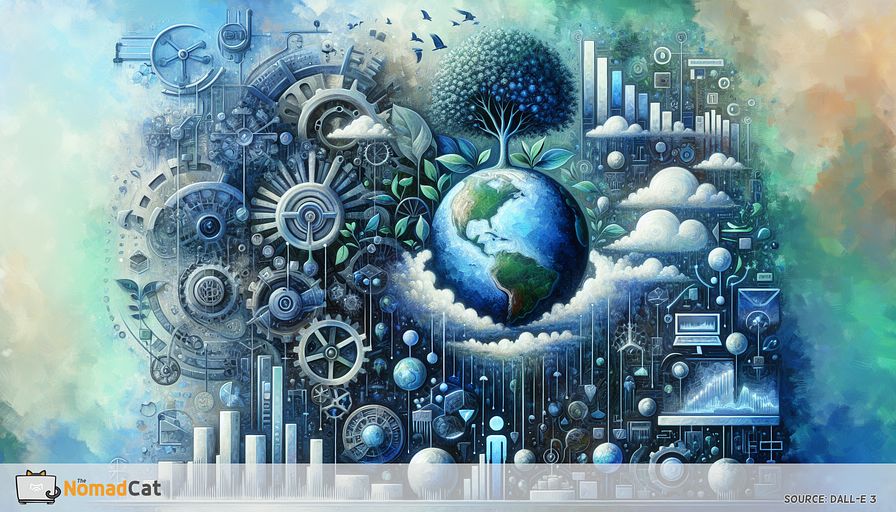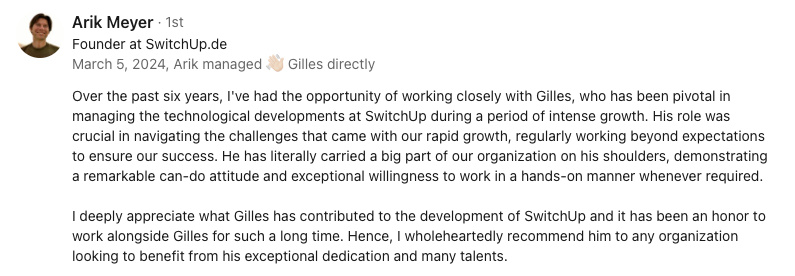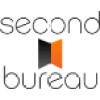Abstract:
In an era where environmental concerns and ethical considerations are increasingly at the forefront of business strategies, 'Green Futures in Business Ethics' explores the critical intersection between sustainability and corporate responsibility. This article delves into the ways in which businesses are reshaping their models to not only achieve financial success but also contribute positively to the planet and society. It discusses the integration of green technologies, ethical business practices, and sustainable development goals into corporate governance. Highlighting real-world examples of companies leading the charge, the article provides valuable insights for technology leaders and directors on how to navigate and implement sustainable initiatives within their organizations, ensuring that they are positioned for long-term success and are recognized as responsible stewents of the environment.
Green Futures in Business EthicsThe Growing Imperative of Business Ethics in the Green Era
The corporate world is currently standing at a crossroads, one path leading towards sustainability and the other, well, let's just say it's not where we'd like to end up. As environmental concerns escalate, businesses are increasingly finding themselves under the microscope, not just for their financial performance but for their impact on the planet. This scrutiny brings to light the intertwining of sustainability and corporate responsibility—two buzzwords that are quickly becoming the bedrock of strategic business planning. It's not just about being green for the sake of marketing anymore; it's about weaving environmental consciousness into the very fabric of an organization's ethos.
Imagine a world where every boardroom meeting includes a discussion on carbon footprints as much as profit margins. We're not there yet, but the tide is certainly turning. Companies are recognizing that the long-term success of their business is directly linked to the health of the environment. With consumers, employees, and investors alike demanding more ethical practices, businesses are recalibrating their strategies to focus on sustainable growth. It's a competitive edge that does more than just boost the bottom line—it ensures that there's still a world worth doing business in for future generations.
The essence of this pivot towards green technologies and sustainable practices isn't just a moral compass recalibration—it's smart business. Companies that are quick to adapt are finding themselves at the forefront of an industry revolution, leading the charge towards a more sustainable and ethically responsible corporate landscape. It's no longer a question of if businesses should integrate these practices, but how quickly they can do so. After all, a green future is not just a possibility; it's an imperative for survival and success in the modern corporate arena.
The Shift Towards Green Technologies and Sustainable Practices
The journey to sustainability is less of a leisurely stroll in the park and more of a determined sprint for survival. With the planet issuing a mayday signal loud and clear, businesses are swiftly lacing up their eco-friendly shoes, ready to run the good race. And what does this race entail, you ask? A hefty dose of innovation, a shift in mindset, and an embrace of green technologies and sustainable practices that are as good for the ledger books as they are for Mother Earth.
Striking the Right Balance: Profit, Planet, and People
For far too long, the pursuit of financial success was a road paved with environmental shortcuts. But as it turns out, the tolls on this road are exceedingly high—risking irreversible damage to our planet. Enter the era of sustainable business practices, where the goal is not just to flourish financially but to make a positive impact on the environment and society. The mantra now is profit with principle, where achieving financial goals goes hand in hand with environmental stewardship.
Advanced technologies and ethical operations are at the heart of this transformation. Companies are exploring renewable energy sources, like solar and wind, to power their operations, significantly reducing their carbon footprint. They're also investing in eco-friendly materials and sustainable supply chains, ensuring that their products are kind to the planet from start to finish.
Examples from the Frontlines of Innovation
Let’s spotlight some heroes leading the charge in weaving sustainability into their corporate DNA:
- Renewable Energy Adoption: Major tech companies are setting the trend by powering their data centers with renewable energy, showcasing that you can indeed run massive operations without leaving a massive carbon footprint.
- Green Manufacturing: The auto industry, once a byword for pollution, is driving forward with electric vehicles. This seismic shift not only promises cleaner air but also heralds a new era of innovation in transportation.
- Sustainable Supply Chains: Leading fashion and consumer goods companies are tracing their supplies back to sustainable sources, ensuring that their products not only look good but also do good.
- Waste Reduction Techniques: From zero-waste packaging initiatives to water recycling systems, businesses across sectors are proving that reducing waste is not just environmentally sound but also economically viable.
This evolution towards green technologies and sustainable practices is not just a fleeting trend—it's the blueprint for future business success. Companies are finding that by aligning their operations with the principles of sustainability, they're not only contributing to a healthier planet but are also unlocking new avenues for innovation and growth. After all, there's nothing like the challenge of saving the planet to get those creative juices flowing.
So, while the road to sustainability might be paved with challenges, it's also lined with opportunities. For businesses, it's no longer just about survival but about thriving in a world where green is the new gold. The shift towards sustainable practices is a testament to the power of innovation and resilience in the face of environmental challenges. It's a journey where every step taken in the right direction counts, and where every effort towards sustainability is a building block for a greener, more prosperous future.
In this green marathon, businesses are finding that the race towards sustainability is not just about who gets there first but about who does it right. And as they continue to innovate and adapt, they're paving the way for a future where business success and environmental stewardship go hand in hand. So, as we cheer on these corporate champions of sustainability, let's remember that in the great race for a greener planet, we're all in it together—running towards a finish line where everyone wins.
Ethical Business Practices and the Embrace of Sustainable Development Goals (SDGs)
Peeling back the layers of corporate operations, we're witnessing a substantial trend where ethical business practices and the harnessing of Sustainable Development Goals (SDGs) are no longer the sprinkles on the doughnut but the very dough itself. This segment dives deep into how incorporating these elements into the core of business strategies is transforming the very architecture of organizational cultures and operations. It's a shift that's reforming the corporate world from the inside out, pointing us toward a more responsible and sustainable future.
The Backbone of Ethical Business: Challenges and Triumphs
Embedding ethical considerations and SDGs into corporate governance is akin to teaching an old dog new tricks—challenging yet incredibly rewarding. For starters, aligning business strategies with the 17 SDGs requires a radical rethinking of priorities and practices. It's a bit like trying to solve a Rubik's Cube blindfolded—every twist affects the outcome, but once you get it right, the sense of achievement is unbeatable.
The benefits of integrating these ethical considerations extend far beyond the traditional borders of corporate responsibility. Businesses that successfully align their operations with SDGs often discover untapped markets, innovate new products, and build deeper connections with their customers and communities. It's a transformation that shifts the narrative from "what can we take" to "how can we give back"—a fundamental change in the corporate psyche.
The Driving Force: Leadership's Role in Embracing Change
At the heart of this transformative journey lies the pivotal role of leadership. Visionary leaders are the maestros orchestrating this symphony of change, uniting teams under a common purpose and navigating the complex landscape of ethical business practices. They're the ones convincing the boardroom that the path to profitability doesn't have to be paved at the expense of the planet or people. Think of them as the captains of eco-friendly ships, steering their companies through the stormy seas of change toward sustainability and ethical prosperity.
- Engagement and Education: Empowering employees through training and engagement initiatives help embed sustainability and ethics into the company culture. It's about making every team member an ambassador of change, fully vested in the company's mission to achieve the SDGs.
- Transparency and Accountability: Leadership must champion transparency in operations and decision-making processes. This involves setting clear targets related to SDGs and openly communicating progress and challenges. It's the equivalent of saying, "Here's what we're doing, here's why, and here's how we can do better."
- Innovation with Purpose: Encouraging innovation not just for profit but for solving real-world challenges is critical. Leaders who foster an environment where employees are encouraged to think outside the box and develop solutions that further SDGs are truly setting their companies apart.
Overcoming the hurdles of integrating SDGs and ethical practices into corporate strategies requires not just determination but a bold reimagining of what success looks like. It's about creating a legacy that future generations will benefit from—a business model that's as sustainable as it is profitable.
As we observe the tectonic shifts in corporate cultures and operations through the lens of sustainability and ethical practices, it’s clear that businesses are not just running a race for profitability but for a better future. With every step towards embracing SDGs, companies are not only enhancing their competitiveness in the global market but are also crafting a world where business success and social responsibility are two sides of the same coin. So, as businesses continue to march towards this noble horizon, let’s applaud their efforts, for in the grand scheme of things, every bit counts in forging a greener, more ethical future.
Navigating the Future with Sustainable Initiatives
In the vibrant marathon toward a green future, technology leaders and company directors are not just participants but the torchbearers who light the way for others. The journey mapped out in our discourse highlights not only the necessity but the inherent value of steering organizations towards sustainable initiatives. It's a course charted with the objective of not merely surviving in a green economy but thriving in it, ensuring that these shifts contribute to long-term success and recognition as responsible environmental stewards.
Every Step Counts in the Rush Towards Sustainability
Let's momentarily pause and reminisce about the insights uncovered through our dialogue. From the integration of green technologies and sustainable practices to the embracing of sustainable development goals (SDGs), it is evident that the path of sustainability is rich with prospects for innovation, growth, and ethical advancement. It's akin to setting sail in uncharted waters with the compass of sustainability guiding us — where every decision and action holds the potential to contribute significantly toward a balanced ecosystem.
However, navigating this course demands more than just a superficial commitment to being green. It requires a deep-seated conviction and proactive engagement from the upper echelons of corporate leadership down to every team member within an organization.
The Role of Technology Leaders and Directors
In the realm of sustainable development, technology leaders and company directors are the architects and builders. Their unique position allows them to draft the blueprint and lay the foundation for an ethos that values, above all, the balance between economic growth, environmental health, and societal well-being. But what specific strategies can these leaders employ to anchor their organizations firmly in the principles of sustainability?
- Leading by Example: Leaders must embody the change they wish to see. By adopting personal and professional habits that reflect a commitment to sustainability, they inspire others within the organization to follow suit.
- Investing in Green Technologies: Directing investments towards innovative technologies that minimize environmental impact signals a clear commitment to sustainable development.
- Empowering Employees: Creating a culture where every employee feels responsible and empowered to contribute to the organization's sustainability goals fosters an environment of innovation and cooperation.
By prioritizing these approaches, leaders can create ripple effects that encourage a broader embrace of sustainable practices within their industries and beyond.
Crafting a Legacy of Sustainability
The implementation of sustainable initiatives is not just an exercise in brand enhancement or regulatory compliance. It is, at its core, an opportunity to build a lasting legacy—a testament to a company's commitment to not just prosper but to do so responsibly and ethically.
This legacy is built on the recognition that businesses play a critical role in shaping the future of our planet. A future where technology and business innovations contribute to the healing of the world, rather than its depletion. Where the success of an organization is measured not just by its financial achievements but by its positive impact on the environment and society.
The journey towards such a future may be fraught with challenges, but it is also abundant with opportunities. Opportunities to redefine industry standards, to pioneer sustainable innovations, and to lead the way in ethical business practices. It is a journey that requires courage, vision, and an unwavering commitment to the principles of sustainability.
In closing, let's take a moment to envision the role of business in a sustainable future. Imagine a world where companies are celebrated not just for their products or profits but for their contribution to a healthier planet and society. Where the success stories of the corporate world are those that tell of remarkable achievements in sustainability and ethical practices.
The critical role of ethical business practices in shaping such a future cannot be overstated. It is these practices that will determine the legacy we leave for future generations— a legacy of responsibility, sustainability, and hope.
As we continue to navigate the path towards sustainable development, let us do so with the knowledge that each step we take brings us closer to a more prosperous, equitable, and sustainable world. A world where businesses are not merely participants in the economy but stewards of the environment and champions of social progress. Let this vision guide our actions and inspire us to relentless pursuit of sustainability—a pursuit in which every effort, no matter how small, contributes to the writing of a greener chapter in the story of humanity.














